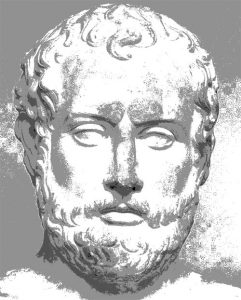The Orator of Athens Aeschines

Atromitos was sent into exile by the Thirty Tyrants and went to Corinth but later found himself in Asia as a mercenary. Returning to Athens, he fought in 404 BC. on the side of Thrasybulus against the Thirty Tyrants, with the aim of restoring democracy.
In the Peloponnesian War he was financially destroyed and when he returned to Athens, he faced a problem of survival. In order to survive, he opened a school (Teaching) and became a letter teacher, teaching the children grammar and other subjects.
Aeschines’ mother, Glaucothea, was the sister of the general Cleobolus. Her original name was Ebussa and she performed religious mysteries, in which Aeschines helped her.
As a child, Aeschines helped his father at school “they scrubbed the black and sponged the pedestals and the girls’ pedagogy, poor class, they have no free children”.
The orator had two brothers, Philocharis and Afofitos. Filocharis was older than him and was elected general several times. Afofitos was smaller and in 351 BC. he was sent to the king of the Persians as an ambassador, while in the period 350-346 BC. he was involved in the management of the city’s finances.
Aischinis belonged to the municipality of Kothokides (today’s location near Aspropyrgos) and married the daughter of Philodimos from Paania, with whom they had two sons and a daughter.
As his family faced financial hardship, Aeschines was unable to attend a higher school of rhetoric. But there is evidence that he studied under Isocrates, Plato and Leodamans. In any case, he learned his first letters in his father’s school where he helped clean it, but he also taught. This is confirmed by Demosthenes, who in his writings is generally very hostile to Aeschines.
At a very young age he participated with third roles in theater performances. In one performance he had the role of Oinomaus, but he fell and the audience disapproved of him, while in another performance he was again disapproved by the spectators who almost stoned him, as a result of which he left the theater. So seeing that he has no future as an actor, he gave up acting.
In 368 BC participated in the battle of Fliountos, in 362 BC. in the battle of Mantineia and in 349 BC. in the battle of Tamyna, in Evia. As a soldier he stood out for his bravery and on the battlefield of Tamyna he was crowned by general Phokion. Immediately afterwards he came to the city personally announcing his victory, and for this the municipality crowned him.
He was sentenced to a fine and for infidelity. After that he fled to Rhodes where he founded a school of rhetoric. He died in 314. Only three discourses have survived from his works. The case against Timarchos, the case against Paraembassy (his apology) and the case against Ctesiphon. His speeches are considered excellent examples of rhetorical art.
As an orator, Aeschines’ style was characterized by clear and persuasive speech, often marked by emotional appeals. He skillfully used legal and moral arguments to engage his audience, though he was sometimes criticized for not having the intellectual depth of Demosthenes.
Aeschines’ speeches provide valuable insights into the political, social, and legal life of classical Athens. Although he was overshadowed by Demosthenes during and after their lifetimes, modern assessments recognize his skill as an orator and his contributions to the rhetoric and politics of his time.
